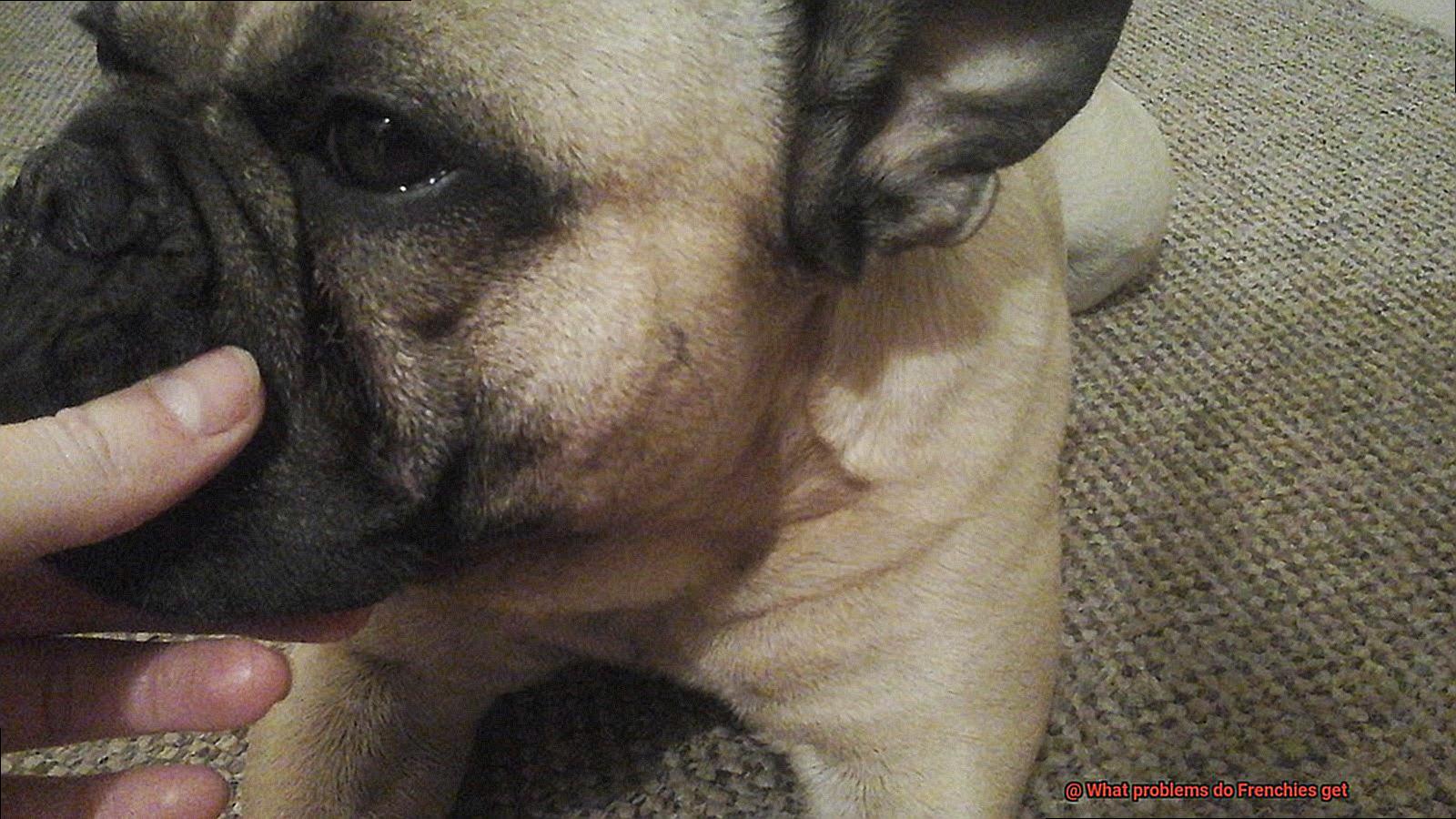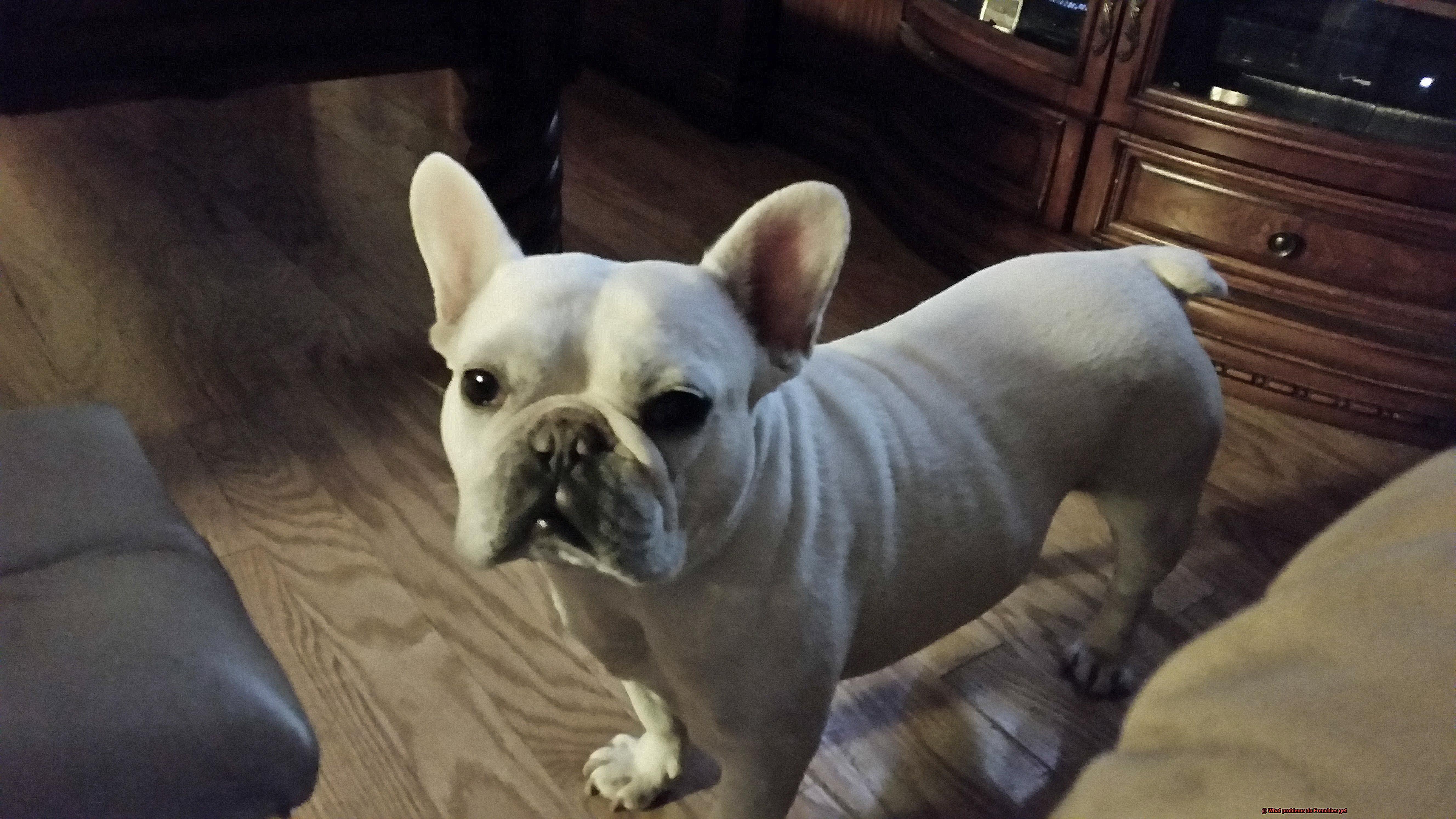What problems do Frenchies get?
With their irresistible charm and squishy faces that could melt even the iciest of hearts, it’s no surprise these little rascals have become a global sensation among dog enthusiasts. But beneath their adorable exterior lies a hidden truth: our beloved Frenchies often grapple with a range of health issues.
Welcome to our blog post, where we’ll uncover the common health woes that plague French Bulldogs. Whether you’re a devoted pet parent or considering adding one of these furry bundles of joy to your family, it’s crucial to be well-informed about the potential challenges they may face throughout their lives. By understanding these obstacles, we can provide our four-legged companions with the utmost care and affection they deserve.
Join us on this enlightening journey as we dive headfirst into the world of French Bulldogs, shining a light on the health problems that frequently come knocking on their adorable little doors. From brachycephalic respiratory troubles to pesky skin allergies and even spine disorders, we’ll explore the unique hurdles that often cross paths with our precious Frenchies.
So grab yourself a steaming cup of joe, get cozy in your favorite spot, and let’s embark on this eye-opening expedition through the sometimes rocky medical terrain of owning a French Bulldog. Together, we’ll deepen our understanding of their health concerns and discover effective ways to keep these lovable creatures in tip-top shape – healthy, happy, and thriving every step of the way.

Understanding Brachycephalic Airway Syndrome in French Bulldogs
Contents
- 1 Understanding Brachycephalic Airway Syndrome in French Bulldogs
- 2 Allergies in French Bulldogs: Symptoms and Treatment Options
- 3 Common Eye Conditions in French Bulldogs
- 4 Skin Problems in French Bulldogs
- 5 Interdigital Cysts: Causes and Treatment for French Bulldogs
- 6 Gastrointestinal Issues in French Bulldogs
- 7 Preventative Care Tips for French Bulldog Health Issues
- 8 Dealing with the Cost of Treating Health Problems in French Bulldogs
- 9 Conclusion
French Bulldogs are undeniably adorable with their smushed faces and bat-like ears. But did you know that their unique facial structure can cause serious health problems? One of the most common issues faced by Frenchies is Brachycephalic Airway Syndrome (BAS). In this guide, we’ll dive into the causes, symptoms, diagnosis, and treatment options for this condition, so you can better understand and care for your beloved Frenchie.
Causes of Brachycephalic Airway Syndrome:

The primary cause of BAS lies in the French Bulldog’s shortened skull structure and excessive soft tissue in their airway. This combination leads to obstruction and restricted airflow, making it difficult for them to breathe properly. Imagine trying to breathe through a straw that’s been pinched shut – not an easy task.
Symptoms of Brachycephalic Airway Syndrome:
If your Frenchie is suffering from BAS, you may notice some telltale signs. They often have noisy breathing, snore like a chainsaw, and pant excessively. You might even see them gag or cough as they struggle to catch their breath. These symptoms can be more severe during hot weather or strenuous activities when their compromised airway is put under additional stress.
Diagnosing Brachycephalic Airway Syndrome:
To determine if your French Bulldog has BAS, a visit to the veterinarian is in order. They will conduct a thorough physical examination and may recommend imaging studies such as X-rays or airway endoscopy to assess the severity of the condition. The vet will assess the anatomical abnormalities associated with BAS, which may include narrowed nostrils (stenotic nares), an elongated soft palate, a narrow trachea, or a collapsed larynx.
Treatment Options for Brachycephalic Airway Syndrome:
Managing BAS requires a combination of lifestyle modifications, medical management, and in some cases, surgical intervention. Lifestyle changes can include avoiding strenuous exercise and keeping your Frenchie in a cool environment to prevent respiratory distress. Medical management may involve medications that reduce inflammation and improve breathing. However, for severe cases, surgical procedures like nares widening, soft palate resection, or laryngeal surgery may be necessary to correct the anatomical abnormalities causing the airway obstruction.
Long-Term Management and Preventive Measures:
It’s important to understand that BAS is a chronic condition that requires ongoing management and monitoring. Regular follow-up visits with your veterinarian will help assess your Frenchie’s breathing function and adjust treatment as needed. Additionally, responsible breeding practices that prioritize the health and welfare of the breed can help reduce the prevalence of BAS. Avoiding excessive heat exposure is also crucial, as brachycephalic breeds are more prone to heatstroke due to their compromised airways.
Allergies in French Bulldogs: Symptoms and Treatment Options
If you have a French Bulldog, you may already know that these adorable little pups are prone to various allergies. Just like humans, French Bulldogs can develop food allergies, environmental allergies, and even flea allergies. In this article, we’ll explore the symptoms of allergies in French Bulldogs and discuss the different treatment options available.
Food Allergies:
Food allergies in French Bulldogs can cause a range of symptoms, including skin problems, digestive issues, and ear infections. Common allergens for Frenchies include beef, chicken, dairy products, wheat, and soy. If your Frenchie is experiencing any of these symptoms after eating certain foods, it’s worth considering a food allergy as the culprit.
Environmental Allergies:
French Bulldogs can also be sensitive to their environment. Pollen, dust mites, mold spores, and certain chemicals can trigger allergic reactions in these pups. Symptoms of environmental allergies may include itching, redness, sneezing, watery eyes, and even hair loss. It’s important to pay attention to any changes in your Frenchie’s behavior or appearance that may indicate an allergic reaction to their surroundings.
Flea Allergies:
Fleas are not only annoying but can also cause allergic reactions in French Bulldogs. Even just one flea bite can trigger intense itching and skin irritations in sensitive dogs. If your Frenchie seems to be scratching excessively or has red and irritated skin, it’s essential to check for fleas and take appropriate measures to eliminate them.
Diagnosing Allergies:
If you suspect that your French Bulldog has allergies, it’s important to consult with a veterinarian for a proper diagnosis. A thorough examination will be conducted to rule out other possible causes of your Frenchie’s symptoms. In some cases, allergy testing such as blood tests or skin tests may also be necessary to identify the specific allergens affecting your pup.
Treatment Options:
The primary treatment for allergies in French Bulldogs is to avoid the allergen whenever possible. This may involve changing your Frenchie’s diet to eliminate potential food allergens or making adjustments to their environment to reduce exposure to environmental allergens. Regular grooming and maintenance of your Frenchie’s coat can also help alleviate allergy symptoms by reducing the presence of allergens on their skin and fur.
In cases where avoidance is not possible or effective, veterinarians may prescribe medications to manage the symptoms. Antihistamines, corticosteroids, and immunotherapy (allergy shots) are some of the options that may be recommended. It’s essential to work closely with your veterinarian to develop a treatment plan tailored to your Frenchie’s specific needs.
Common Eye Conditions in French Bulldogs
French Bulldogs, those lovable little furballs, are not just known for their charming personalities but also for their susceptibility to various eye conditions. As a responsible French Bulldog owner, it’s crucial to be well-informed about these common eye issues and their treatments. So, let’s dive in and explore these eye conditions that can affect your French Bulldog, and discover how you can keep those puppy eyes bright and healthy.
Cherry Eye:
Picture this: your French Bulldog’s adorable eyes suddenly have a pinkish protrusion from the inner corner. That’s cherry eye. This condition occurs when the tear gland in the third eyelid becomes inflamed and swollen. While it may sound delicious, cherry eye can cause discomfort and may even lead to dry eye if left untreated. Treatment options include medication to reduce inflammation or surgical correction. Remember, don’t delay seeking veterinary care – catch that cherry eye early.
Corneal Ulcers:
Ouch. Your French Bulldog’s eyes are precious, but accidents happen. Corneal ulcers are open sores on the cornea’s surface, caused by trauma, foreign bodies, or underlying health conditions. Signs of corneal ulcers include excessive tearing, squinting, redness, and discharge. Prompt veterinary care is essential to prevent complications such as infections and scarring. Treatment may involve medication, protective contact lenses (yes, dogs can wear contacts too.), or in severe cases, surgery.
Entropion:
Oh no. Your French Bulldog’s eyelids are rolling inward, causing those cute lashes to rub against the cornea. This condition is called entropion and can result in irritation, redness, and even corneal ulcers if left untreated. Don’t fret; surgical correction is often necessary to alleviate discomfort and prevent further damage to the cornea. Your Frenchie will be thanking you for restoring their puppy eyes.
Dry Eye (Keratoconjunctivitis Sicca):
Just like us, French Bulldogs can suffer from dry eyes too. Dry eye occurs when there is insufficient tear production, leading to discomfort, redness, discharge, and potential corneal ulcers. Treatments for dry eye may involve artificial tears (no, not the crocodile kind.), medication to stimulate tear production, or in severe cases, surgery. Keep those eyes moisturized and sparkling.
Progressive Retinal Atrophy (PRA):
Oh, the heartbreak. Progressive Retinal Atrophy (PRA) is a degenerative condition that causes gradual deterioration of the retina, leading to progressive vision loss and eventual blindness. While there’s no cure for PRA, regular veterinary check-ups combined with supportive care can help manage the condition and slow down its progression. Cherish every moment with your furry friend and adapt their environment to make life easier for their impaired vision.
Skin Problems in French Bulldogs
French Bulldogs are undeniably adorable, with their wrinkled skin and expressive eyes. But unfortunately, those wrinkles can also be a breeding ground for various skin problems. As an expert on skin issues in French Bulldogs, I’m here to shed some light on the different types of skin problems these lovable pooches are prone to and provide some tips on how owners can prevent or manage them.
Allergies:
One of the most common skin issues that Frenchies face is allergies. These allergies can be caused by environmental factors such as pollen, dust mites, or certain foods. Symptoms of allergies in French Bulldogs may include itching, redness, swelling, and even hair loss. To help prevent allergies in your Frenchie, consider the following:
- Regularly clean your Frenchie’s bedding and living environment to minimize exposure to allergens.
- Use hypoallergenic dog shampoos and grooming products.
- Consult with your veterinarian about potential food allergies and consider a hypoallergenic or limited ingredient diet.
Pyoderma:
French Bulldogs are also prone to pyoderma, a bacterial infection of the skin. This condition occurs when bacteria enters the skin through scratches, cuts, or insect bites. To prevent pyoderma:
- Regularly clean and inspect your Frenchie’s skin.
- Keep their wrinkles dry and clean to reduce the risk of bacterial growth.
- Avoid using harsh chemicals or excessive bathing, as it can disrupt the natural balance of their skin.

Atopic Dermatitis:

Atopic dermatitis is a chronic inflammation of the skin that often has a genetic component. It can be triggered by allergens in the environment. To manage atopic dermatitis in your Frenchie:
- Bathe them regularly with a gentle, hypoallergenic shampoo.
- Keep their environment clean and free from potential allergens.
- Consult with your veterinarian about potential allergy testing or treatment options.
Demodectic Mange:
Demodectic mange is caused by an overgrowth of mites that naturally live on the skin. It usually affects puppies with weak immune systems but can also occur in adult Frenchies with compromised immune systems. To manage demodectic mange:
- Seek veterinary care for proper diagnosis and treatment.
- Follow your veterinarian’s instructions for medicated baths and topical treatments.
- Boost your Frenchie’s immune system through a healthy diet and regular exercise.
Interdigital Cysts:
Interdigital cysts are small fluid-filled sacs that form between the toes. They can cause discomfort and pain for your Frenchie and may require veterinary treatment to remove or drain them. To prevent interdigital cysts:
Interdigital Cysts: Causes and Treatment for French Bulldogs
French Bulldogs, those little balls of adorable wrinkles, are prone to a pesky problem called interdigital cysts. These cysts, also known as interdigital furuncles, can cause discomfort and pain for our furry friends. But fear not. As an expert in French Bulldog health, I’m here to guide you through the causes and treatment options for interdigital cysts so you can keep your Frenchie’s paws happy and healthy.

Causes of Interdigital Cysts in French Bulldogs
- Trapped Dirt and Bacteria: French Bulldogs have short and compact feet, making it easier for dirt, debris, and bacteria to get stuck between their toes. The warm and moist environment between their little piggies becomes a breeding ground for those nasty cysts.
- Allergies: French Bulldogs are no strangers to allergies. Pollen, grass, and even certain foods can trigger allergic reactions that lead to inflammation and irritation in their paws. And you guessed it – irritated paws are more prone to developing those frustrating cysts.
- Skin Conditions: Some Frenchies may have pre-existing skin conditions like atopic dermatitis or contact dermatitis, which can increase their risk of developing interdigital cysts. It’s like a double whammy of skin troubles.
Symptoms of Interdigital Cysts
Spotting interdigital cysts in your French Bulldog isn’t rocket science. Keep an eye out for these telltale signs:
- Redness and swelling between the toes
- Limping or lameness
- Discomfort when walking or standing
- Excessive paw licking
- Signs of pain (cue the sad puppy eyes)

Treatment Options for Interdigital Cysts
When it comes to treating interdigital cysts in French Bulldogs, there are a few steps you can take:
- Cleanliness is Key: Start by cleaning the affected area thoroughly. Soak those paws in a mild antiseptic solution or use medicated wipes recommended by your vet. Keeping things clean and dry will help prevent further bacterial growth.
- Antibiotics to the Rescue: In some cases, your vet may prescribe oral or topical antibiotics to combat the infection and reduce inflammation. They may also recommend anti-inflammatory medications or pain relievers to give your Frenchie some much-needed relief.
- Allergy Management: If allergies are contributing to your Frenchie’s cyst problem, your vet might suggest allergy testing and a tailored treatment plan. Managing those allergies can go a long way in preventing future cysts.

Gastrointestinal Issues in French Bulldogs

These adorable pooches are prone to a range of gastrointestinal issues that can cause discomfort and distress. As a responsible owner, it’s important to be well-informed about these problems and take appropriate measures to keep your Frenchie’s tummy happy and healthy.
Flatulence: The Battle of the Burps
French Bulldogs have a compact body structure and short muzzles, making them more susceptible to swallowing air while eating or drinking. This can result in excessive gas production and, let’s be honest, some less-than-pleasant odors. To minimize flatulence, try feeding your Frenchie smaller, more frequent meals and avoid foods that are known to cause gas.
Bloat: A Twisted Nightmare
Gastric dilatation-volvulus, or bloat, is a serious condition that can affect French Bulldogs. It occurs when the stomach fills with gas or fluid and twists upon itself, often leading to life-threatening consequences. Keep an eye out for symptoms like a distended abdomen, unproductive vomiting, and restlessness. If you suspect bloat, seek immediate veterinary attention.
Food Allergies: Not All Treats Are Created Equal

French Bulldogs are known for their sensitive tummies and may develop food allergies or sensitivities. Common signs include diarrhea, vomiting, and excessive scratching or licking. Identifying and eliminating the allergen from their diet is essential in managing these issues and ensuring optimal gut health.
Pancreatitis: A Pain in the Belly
Pancreatitis, characterized by inflammation of the pancreas, can be triggered by high-fat diets or the consumption of toxic foods like chocolate or onions. This condition can cause severe abdominal pain, vomiting, and diarrhea. Opt for a balanced and appropriate diet to minimize the risk of pancreatitis in your Frenchie.
Brachycephalic Airway Syndrome: Breathing Troubles
French Bulldogs, with their adorable squished faces, are prone to brachycephalic airway syndrome. This condition affects their ability to breathe properly and can lead to regurgitation or vomiting of food. The compromised airway can result in gastrointestinal issues such as acid reflux or esophagitis.
Gastroenteritis: Tummy Troubles
Gastroenteritis, characterized by inflammation of the stomach and intestines, can be caused by infections, dietary changes, or ingestion of inappropriate substances. Symptoms include vomiting, diarrhea, loss of appetite, and abdominal pain. Ensure your Frenchie’s diet is balanced and appropriate, and be cautious about exposing them to potential sources of infection.
Preventative Care Tips for French Bulldog Health Issues

French Bulldogs are adorable and lovable pets, but they are also prone to certain health issues. As a responsible owner, it is important to take preventative measures to ensure the well-being of your furry companion. By following these preventative care tips, you can help minimize the risk of common health problems and keep your French Bulldog healthy and happy.
Regular veterinary check-ups:
Regular visits to the veterinarian are essential for maintaining your French Bulldog’s health. These check-ups allow the vet to perform a thorough examination and detect any potential health issues early on. Your vet can provide guidance on vaccinations, diet, exercise, and other important aspects of your Frenchie’s care. By staying proactive with regular check-ups, you can ensure that your Frenchie receives the necessary care and treatment to stay healthy.
Vaccinations:
Vaccinations are crucial for protecting your French Bulldog against various diseases. Consult with your veterinarian to create a vaccination schedule that meets your Frenchie’s specific needs. Keeping up-to-date with vaccinations can prevent serious illnesses and provide peace of mind knowing that your Frenchie is protected.
Dental care:
Proper dental care is vital for French Bulldogs as they are prone to dental issues. Regular brushing with dog-specific toothpaste and providing dental treats or toys can help maintain good oral hygiene. Additionally, scheduling professional dental cleanings when recommended by your vet can further prevent dental problems in your Frenchie.
Proper nutrition:
A balanced diet is essential for keeping your French Bulldog healthy. Consult with your veterinarian to determine the appropriate diet for your Frenchie based on their age, activity level, and any specific health concerns. Feeding high-quality dog food and avoiding toxic foods will support their overall health and reduce the risk of digestive issues.

Regular exercise:
While French Bulldogs may not require as much exercise as some other breeds, they still need regular physical activity to stay healthy. Daily walks or playtime can help prevent obesity and keep your Frenchie in good shape. Be mindful of their brachycephalic structure and avoid excessive exercise in hot weather to prevent breathing difficulties.
Dealing with the Cost of Treating Health Problems in French Bulldogs
French Bulldogs are undeniably charming and make wonderful companions. However, it’s important to acknowledge that these adorable little pooches are prone to certain health issues. While this may seem daunting, there are proactive steps you can take to manage the costs associated with treating these health problems. In this guide, we will explore various strategies and resources that can help you provide the best care for your French Bulldog without breaking the bank.
Pet Insurance: Your Safety Net
Investing in pet insurance is a smart move for any French Bulldog owner. It can significantly offset the financial burden of veterinary bills by covering a portion of the expenses. Take the time to research different providers and policies to find one that offers comprehensive coverage for French Bulldogs’ specific health issues. Some reputable pet insurance companies include Trupanion, Healthy Paws, and Nationwide.
Preventive Care: The Key to Long-term Savings
Prevention is always better than cure, and this rings true for French Bulldogs too. By practicing preventive care, such as regular veterinary check-ups, vaccinations, and preventive medications, you can detect and address potential health problems early on. This proactive approach not only ensures the well-being of your furry friend but also reduces the need for costly treatments in the future.
Budgeting for Veterinary Care: Financial Peace of Mind
Setting aside a budget specifically for veterinary care is an excellent way to manage the cost of treating health problems in French Bulldogs. By saving a certain amount each month, you can be prepared when unexpected medical expenses arise. This approach provides peace of mind, knowing that you have a safety net specifically dedicated to your furry companion’s well-being.
Responsible Breeding: Minimizing Health Risks
When acquiring a French Bulldog, it’s crucial to seek out reputable breeders who prioritize the health and well-being of their dogs. Responsible breeders conduct thorough health screenings on their breeding dogs to avoid passing on genetic conditions to their offspring. By choosing a healthy puppy from a reputable breeder, you can significantly reduce the risk of encountering severe health problems down the line.
Em5WE9QFfa0″ >
Conclusion
French Bulldogs, or Frenchies as they are affectionately called, are adorable and lovable companions. However, they are prone to certain health issues that can cause concern for their owners. These problems include brachycephalic syndrome, which affects their breathing due to their short snouts and compacted airways. This can result in respiratory difficulties and even heatstroke in extreme cases.
Another common problem faced by Frenchies is allergies. They can be sensitive to certain foods, environmental factors like pollen or dust mites, and even grooming products. These allergies can manifest as skin irritations, itching, redness, and ear infections.
French Bulldogs are also susceptible to various eye problems. Their prominent eyes make them prone to conditions like cherry eye (prolapsed gland of the third eyelid), dry eye (insufficient tear production), and corneal ulcers. Regular check-ups with a veterinarian are crucial to detect these issues early on and provide appropriate treatment.
Furthermore, Frenchies have a genetic predisposition to spinal disorders such as intervertebral disc disease (IVDD) and hemivertebrae. These conditions can cause back pain, paralysis, or difficulty in walking. Proper exercise management and avoiding activities that put excessive strain on their backs can help prevent these problems from worsening.
Lastly, French Bulldogs are known for their flatulence. While it may seem comical at times, excessive gas can be a sign of digestive issues or dietary intolerances. A balanced diet tailored to their specific needs is essential in managing this problem.
In conclusion, while French Bulldogs make wonderful pets, it’s important for owners to be aware of the potential health problems they may face.




